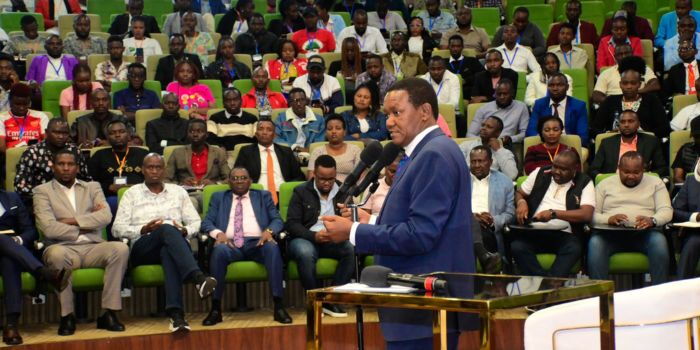Labour and Social Protection Cabinet Secretary Alfred Mutua Appearing before a National Assembly Committee on Tuesday, February 25, 2025.
Photo
Parliament of Kenya
The Ministry of Labour and Social Protection has revealed that it is in the process of restructuring the adult education curriculum in the country.
In a statement on Wednesday, July 16, the Labour Cabinet Secretary, Alfred Mutua, said that the revision of the curriculum, to align with the Competency-Based Education (CBE), aims to ensure that students in these schools are equipped with the necessary skills and knowledge required in today's job market.
The decision was made after the CS had an engagement with officials from the Directorate of Adult Learning and Education, which falls under Mutua's department, to deliberate on how to elevate the effectiveness of adult learning institutions in the country.
Currently, according to the ministry, over 124,000 adult learners are enrolled in various education centres across the country. Mutua affirmed that by giving these adults, who missed out on formal education, a chance to receive education, not only increases their productivity but also enables them to live a fuller life.
Labour and Social Protection Cabinet Secretary Alfred Mutua Appearing before a National Assembly Committee on Tuesday, February 25, 2025.
Photo
Parliament of Kenya
"Today, I held a consultative meeting with officials from the Directorate of Adult Learning and Education, which now falls under the Ministry of Labour and Social Protection following its recent transition from the Ministry of Education," Mutua said.
"As a Ministry, we are fully committed to revitalising adult learning as a transformative force in our society. This is part of our broader agenda to build a fair and empowered nation where every Kenyan, regardless of age, has the opportunity to learn, grow, and thrive with dignity," he added.
Mutua further assured that the ministry is in the process of increasing instructors and adult education officers in the centres, in addition to improving the infrastructural capacity of these schools through increased budgetary allocations.
"The sector continues to face major challenges, including inadequate staffing, outdated curricula, limited funding, societal stigma, and underutilised training centres. Compounding these issues is the lack of up-to-date data, with the last national adult literacy survey conducted as far back as 2006," Mutua said.
The announcement comes days after the National Assembly Committee on Education supported a bill that seeks the official recognition of Alternative Provision for Basic Education and Training (APBET) schools.
APBET schools are institutions that provide education to those who may not have access to formal schools, including learners in informal settlements and remote areas.
The institutions under this category of schools include non-formal education centres, vocational training centres, night schools, home schools, to adult learning institutions.
According to the MPs, the Basic Education (Amendment) Bill, 2025, would ensure that the government maps, registers, provides curriculum guidelines, and dispenses the necessary resources and funds to these schools.
"The purpose for which this Bill was made was, first, to anchor an already existing policy, the Policy Framework for Alternative Provisions for Basic Education and Training," said Mathare Member of Parliament Anthony Oluoch, who is the sponsor of the bill, on Thursday, July 10.
Budget and Appropriations Committee in session in the National Assembly.
Parliament of Kenya

Music mogul Sean 'Diddy' Combs was acquitted of sex trafficking and racketeering charges but convicted on transportation...

Former Arsenal midfielder Thomas Partey has been formally charged with multiple counts of rape and sexual assault by UK ...

JAMB has clarified its admission policies, rectifying a student's status, reiterating the necessity of its Central Admis...

Ghana is undertaking a comprehensive economic overhaul with President John Dramani Mahama's 24-Hour Economy and Accelera...

The 2024 Women's Africa Cup of Nations opened with thrilling matches, seeing Nigeria's Super Falcons secure a dominant 3...

A new opposition coalition, led by the African Democratic Congress (ADC), is emerging to challenge President Bola Ahmed ...
Oba Owolabi Olakulehin, the 43rd Olubadan of Ibadanland, has died at 90, concluding a life of distinguished service in t...

Nigerian football mourns the death of legendary Super Eagles goalkeeper Peter Rufai, who passed away at 61. Known as 'Do...

Labour CS Alfred Mutua launches a multi-agency taskforce to investigate and prosecute rogue recruitment agencies exploit...

KUPPET gives TSC 7 days to initiate discussions on new CBA

The ministry has received a lot of backlash for running the recruitment drives.

It targets those with offer letters from Malindi, Kilifi, Mombasa and Ukunda

Mutua has corrected Gachagua, terming the 'Hi Cousins' narrative disrespectful.